Library of Congress's Blog, page 187
June 6, 2012
Ray Bradbury and Pogo
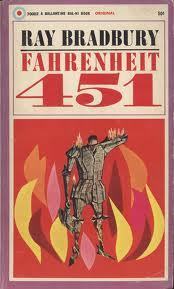 Ray Bradbury, the towering writer of science fiction, died today at age 91. Talk about an author who will be missed …
Ray Bradbury, the towering writer of science fiction, died today at age 91. Talk about an author who will be missed …
In the United States, our lives been steeped in science fiction, from the days of “Buck Rogers” and the cheesy B-movies of the 1950s to the phenomena of “Star Trek,” “The Matrix” and more recent films based on a variety of sci-fi and fantasy works. Yet, for many decades, the genre was sneered at.
Ray Bradbury turned that around.
He elevated the form to literature. He packed it with humanity, and he pointed out – to paraphrase the cartoon character Pogo – that we humans had “met the enemy, and he is us.”
An uncomfortable portion of the world Bradbury created, in novels such as “Fahrenheit 451,” has come to pass. Every time I see someone shambling down the street, staring blankly into a hand-held device, I visualize those two telescreen figures from the movie version of “Fahrenheit 451” looking down at Julie Christie and saying, “Linda, you’re absolutely fantastic!”
And I visualize her, staring back, vacuously.
My favorite piece by Bradbury is the short story “August 2026: There Will Come Soft Rains,” from the collection “The Martian Chronicles.” It’s about an automated house that lives on, pointlessly, after its occupants have been vaporized in a nuclear war.
It was published in 1950, proposing such far-out concepts as machines that audibly tell you to wake up, monitor the weather, activate the kitchen equipment to make breakfast. (All that exists today and is taken for granted). His house of seven decades into the future was cleaned by a small army of mechanical mice that rolled across the floor, picking up debris. (Do you own a Roomba?)
The house offers to recite a favorite poem by Sara Teasdale for its missing owner, since, being no longer in existence, he has declined to specify one.
There will come soft rains and the smell of the ground,
And swallows circling with their shimmering sound;
And frogs in the pools singing at night,
And wild plum trees in tremulous white;
Robins will wear their feathery fire,
Whistling their whims on a low fence-wire;
And not one will know of the war, not one
Will care at last when it is done.
Not one would mind, neither bird nor tree,
if mankind perished utterly;
And Spring herself, when she woke at dawn
Would scarcely know that we were gone.
Do I hear the voice of Siri?
Library in the News: May Recap Edition
May was a musical month with the Library of Congress recognizing song and sounds in a major way. The Library honored Burt Bacharach and Hal David with the 2012 Gershwin Prize for Popular Song. You can read more about it here. The two were celebrated with concerts at both the Library and the White House.
“Music can take you a lot of places you’d never imagine, and I try to never forget the power of what musicians, songwriters and singers do – and how it changes the way people look at their lives,” country crooner Lee Ann Womack, featured performer at the White House event, told AOL Music .
Chris Richards of The Washington Post spoke with Bacharach and David prior to their receiving the award.
“David, 90, is recovering from a stroke and will not be able to travel to Washington, but he calls the recognition ‘the pinnacle’ of his career.”
“Stunning, stunning,” said Bacharach of the honor. “Winning three Academy Awards was pretty spectacular, but I think this might be the absolute peak.”
Other major outlets running stories about the award included The Los Angeles Times, the New York Times, the Associated Press, Playbill and Huffington Post.
Closing out the month was one of the Library’s biggest annual announcements, the inductees into the National Recording Registry. You can see the list here.
The Post’s Richards wrote about the registry, saying:
“The registry, which will celebrate its 10th anniversary this year, focuses on preservation, but recognition plays a huge role too.”
The list not only includes rarities such as an Edison Talking Doll cylinder and a series of interviews with former slaves but also popular, recognizable recordings like Prince’s “Purple Rain” and “I Feel Love,” by Donna Summer.
Major broadcast news outlets NBC and CBS ran stories, as well as entertainment outlets like E!, CMT and BET. In addition to the Post, print coverage included USA Today, Associated Press, The New York Times and the Los Angeles Times.
Receiving accolades of a different kind was Fernando Henrique Cardoso, former president of Brazil, who received the Library’s 2012 John W. Kluge Prize.
Larry Rohter interviewed Cardoso for a piece in The New York Times.
“I was always preparing myself to understand society and macroeconomics, so of course when I had the chance to become president, I tried to apply that knowledge,” Cardoso said. “I didn’t plan it that way, but the concern, the preoccupation with how to construct a decent society was always there.”
The Washington Post and Associated Press also ran stories.
And speaking of politics, the Library has published a book featuring presidential campaign posters about politicians from Andrew Jackson to Barack Obama.
“While the names and faces may have changed and artistic styles evolved, the nature of American politicking, issues and mudslinging have remained constant throughout our country’s history,” wrote Liesl Bradner of the Los Angeles Times.
“One of the beauties of this book is that it doesn’t restrict itself to posters of the winners,” said Tish Wells for the Miami Herald.
Brooke Gladstone, who wrote the introduction to the book, wrote in a blog post for the huffingtonpost.com:
“The most effective campaign posters of every era leave as much as possible to the voter’s imagination. What perhaps is so striking about this collection of posters from the Library of Congress is what it reveals about the unchanging nature of American politicking.”
June 1, 2012
Like a Phoenix, From the Ashes
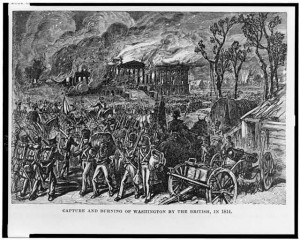 Two hundred years ago today, President James Madison set pen to paper to write . His intent was to talk them into making the nation’s first formal declaration of war – on Great Britain, which was squashing U.S. exports as a side effect of a British naval blockade against Napoleon’s France.
Two hundred years ago today, President James Madison set pen to paper to write . His intent was to talk them into making the nation’s first formal declaration of war – on Great Britain, which was squashing U.S. exports as a side effect of a British naval blockade against Napoleon’s France.
But that flow of ink had many unintended consequences – among them, the eventual conversion of a Library of Congress that consisted of a few hundred law books tucked into the recesses of the U.S. Capitol to the multifaceted house of knowledge it is today – with 151.8 million items on some 838 miles of bookshelves, offering more than 34.5 million books and other printed materials, 3.3 million recordings, 13.4 million photographs, 5.4 million maps, 66.6 million manuscripts and of course the website where you probably found this blog among its 31.4 million files.
Madison got his war – we know it as the War of 1812. Hostilities ensued. The British torched several public buildings in Washington in August of 1814, including Congress and its library.
Within a month, retired President Thomas Jefferson offered his personal library as a replacement. He had spent 50 years accumulating books, “putting by everything which related to America, and indeed whatever was rare and valuable in every science.” There were 6,487 books in the collection; their subject matter was much broader than law and many were in languages other than English.
Congress debated whether to take Jefferson up on his offer. But Jefferson replied, “There is, in fact, no subject to which a member of Congress may not have occasion to refer.” They agreed to buy his library for $23,950, and a whole new Library of Congress was born – one with a comprehensive collections policy that has become the largest library in the world.
You can still see Thomas Jefferson’s library, including thousands of books he personally purchased and then made available to the nation, in an exhibition in the Library of Congress’ Thomas Jefferson Building. You can also learn more about them here.
Postscript: Madison not only got his war, but he, too, eventually got his own building – the James Madison Building of the Library of Congress on Capitol Hill, which is his official memorial. This blog post comes to you from inside its walls.
Jewish Heritage
For the third consecutive year, special items from the Library of Congress’ Jewish American collections have been put on display at the White House. In honor of Jewish American Heritage Month, President Barack Obama hosted a reception at 1600 Pennsylvania Ave. on Wednesday evening.
“Generations of Jewish Americans have brought to bear some of our country’s greatest achievements and forever enriched our national life,” he said in his official proclamation. “Our country is stronger for their contributions, and this month, we commemorate the myriad ways they have enriched the American experience.”
During his speech at the reception, President Obama focused in large part on Gen. Ulysses S. Grant’s order in 1862 to expel Jews “as a class” from the military department of Tennessee. American Jews protested and, with the help of President Abraham Lincoln, the order was revoked.
“And to General Grant’s credit he later realized he had made a serious mistake,” the president said in his speech. “So later in his life he apologized for this order and as president went out of his way to appoint Jews to public office and to condemn the persecution of Jews in Eastern Europe.”
The small display of items contributed by the Library’s Manuscript Division included a set of to Lincoln from the Board of Delegates of American Israelites; a letter to Lincoln from The Missouri Lodge of “Bné B’rith,” the first Jewish organization to formally protest against Order No. 11; Lincoln’s note rescinding Order No. 11; and a receipt for President Grant’s contribution to Washington Synagogue Adas Israel, the first synagogue building built in DC.
In 2004, the Library mounted a major exhibition titled “From Haven to Home” to commemorate 350 years of Jewish life in America.
May 23, 2012
Ten Years of Touchstones
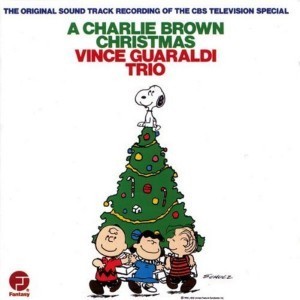
"A Charlie Brown Christmas," the record album
One of the sad facts about the commercialization of the holiday season – for me, anyway — is that many Christmas carols I related to as a child have become so much sonic wallpaper.
On a positive note, though, my inner ear has anointed some tunes as “ex officio” holiday music – the entire Beatles album “Sergeant Pepper’s Lonely Hearts Club Band,” for example, because my brother brought it home during holiday break from college the year it came out. Similar status has been achieved by those wonderful jazz piano riffs by the Vince Guaraldi Trio – the ones that backed the Charlie Brown TV specials.
So I’m pleased that the soundtrack album to “A Charlie Brown Christmas” by the trio is among this year’s 10th-anniversary additions to the National Recording Registry of the Library of Congress. Considering that the registry is chosen, each year, based on nominations, apparently Guaraldi and the Peanuts gang have leaked into other people’s collective subconscious as well.
This year’s list of 25 recordings deemed culturally, historically, or aesthetically significant and therefore worthy of preservation range from the rare or singular to touchstones that form the soundtrack to people’s lives. Next year’s list is now being nominated – if you have suggestions, you can make them here.
You’ve got everything from the Thomas Edison company’s 1888 attempt to put a voice recording inside a doll (it didn’t work out very well — two other firms succeeded at this before the famous “Chatty Cathy” of the 1960s) and the Hawaiian slack-key guitar music of Gabby Pahinui (said to have influenced guitarists Ry Cooder, Leo Kottke and John Fahey) to the late Donna Summer’s “I Feel Love,” an anthem from the Disco era, and “Purple Rain” by Prince and the Revolution.
You’ve got interviews with U.S. citizens who were freed from slavery; a live performance by the Grateful Dead; Dolly Parton’s “Coat of Many Colors”; two signature tunes by the great Bo Diddley; and the New York Philharmonic conducting debut of one of the most famous classical-music conductors of the 20th century, Leonard Bernstein.
The 2012 list:
1. Edison Talking Doll cylinder (1888)
2. “Come Down Ma Evenin’ Star,” Lillian Russell (1912)
3. “Ten Cents a Dance,” Ruth Etting (1930)
4. “Voices from the Days of Slavery,” Various speakers (1932-1941 interviews; 2002 compilation)
5. “I Want to Be a Cowboy’s Sweetheart,” Patsy Montana (1935)
6. “Fascinating Rhythm,” Sol Hoopii and his Novelty Five (1938)
7. “Artistry in Rhythm,” Stan Kenton & and his Orchestra (1943)
8. Debut performance with the New York Philharmonic, Leonard Bernstein (Nov. 14, 1943)
9. International Sweethearts of Rhythm: Hottest Women’s Band of the 1940s (1944-1946)
10. “The Indians for Indians Hour” (March 25, 1947)
11. “Hula Medley,” Gabby Pahinui (1947)
12. “I Can Hear It Now,” Fred W. Friendly and Edward R. Murrow (1948)
13. “Let’s Go Out to the Programs,” The Dixie Hummingbirds (1953)
14. “Also Sprach Zarathustra,” Fritz Reiner and the Chicago Symphony Orchestra (1954, 1958)
15. “Bo Diddley” and “I’m a Man,” Bo Diddley (1955)
16. “Green Onions,” Booker T. & the M.G.’s (1962)
17. “Forever Changes,” Love (1967)
18. “The Continental Harmony: Music of William Billings,” Gregg Smith Singers (1969)
19. “A Charlie Brown Christmas,” Vince Guaraldi Trio (1970)
20. “Coat of Many Colors,” Dolly Parton (1971)
21. “Mothership Connection,” Parliament (1975)
22. Barton Hall concert by the Grateful Dead (May 8, 1977)
23. “I Feel Love,” Donna Summer (1977)
24. “Rapper’s Delight,” Sugarhill Gang (1979)
25. “Purple Rain,” Prince and the Revolution (1984)
May 22, 2012
Teaching the Fourth “R”
(The following is a guest post from Audrey Fischer of the Library’s Public Affairs Office.)
While others critique the nation’s schools’ effectiveness in teaching the three Rs—reading, ‘riting and ‘rithmetic—actor and activist Richard
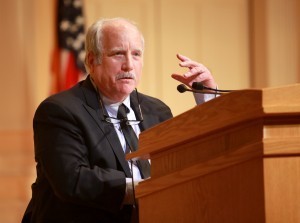
Law Day was celebrated at the Library of Congress on May 1 with an address by Richard Dreyfuss in the Coolidge Auditorium. / Abby Brack Lewis
Dreyfuss is on a crusade to teach the fourth R—republican democracy. His cause célèbre is the restoration of civics education, to ensure that young people understand and perpetuate our unique form of government.
“This country is a miracle and the whole world knows it, except Americans, because we don’t teach it,” said Dreyfuss, during his May 1 talk at the Library of Congress, hosted by the Law Library, to commemorate Law Day, a national day to celebrate the rule of law and its contributions to the freedoms that Americans enjoy.
The webcast can now be viewed at here.
Law Day was a fitting occasion for Dreyfuss to spread his gospel of good government and good citizenship. He has been traveling the nation for the past seven years advocating the teaching of civics and the restoration of civil debate in America. In 2010, he founded The Dreyfuss Initiative, a nonprofit organization whose mission is to educate the next generation about America’s system of government and how to participate in it.
Dreyfuss announced that the organization has its eye on the George Washington family property in West Virginia, on which it would like to build “the first institute for the study of Enlightenment values.” Those values, explained Dreyfuss, had a major impact on the Founding Fathers, who fought against the tyranny of a monarchy and created a republican democracy.
Says Dreyfuss, “We must teach our kids how to run our country with common sense and realism, before it’s time for them to run the country. If we don’t, someone else will run this nation and the experiment of government by, for, and of the people will have failed.”
The Library of Congress is doing its part in assisting educators in teaching American history using primary sources that are available on the Library’s website. Library of Congress resources that educators can use for civics education can be found here.
May 21, 2012
Bacharach and David Tribute Concert on PBS Tonight!
Burt Bacharach and Hal David were recently feted around Washington for receiving the Library of Congress Gershwin Prize for Popular Song. A tribute concert at the White House will be broadcast nationally tonight on PBS at 9 p.m. EDT (check local listings) as “Burt Bacharach & Hal David: The Library of Congress Gershwin Prize for Popular Song In Performance at the White House.”
The concert will feature performances by major stars including Sheryl Crow, Michael Feinstein, Diana Krall, Mike Myers, Lyle Lovett, Rumer, Sheléa, Arturo Sandoval and Stevie Wonder.
In September, the Library announced that Bacharach and David would be the fourth recipients of the prize, which celebrates lifetime achievement in popular song. President Barack Obama presented the award to “the two kings of songwriting” at the White House during the performance.
Librarian of Congress James H. Billington said of the legendary duo, “”The timeless hits by Burt Bacharach and Hal David have helped launch the careers of many of our nation’s most celebrated performers, and they continue to be played on iPods, radio, television, in movies, and performed in cabarets and on the Broadway stage. Their creative talents have inspired songwriters for more than five decades, and their legacy is much in the tradition of George and Ira Gershwin, for whom this award is named.”
May 17, 2012
The Excitement Will Be In Tents
Here’s what you book fiends have been waiting for – the author lineup for the 2012 Library of Congress National Book Festival, Sept. 22 and 23 on the National Mall.
Authors will include towering American novelist Philip Roth and Nobel Prize-winner Mario Vargas Llosa; the irrepressible T.C. Boyle (some of you know him as T. Coraghessan Boyle); Pulitzer Prize-winning novelists Geraldine Brooks, Jeffrey Eugenides and Junot Diaz; poets Nikky Finney (winner of the 2011 National Book Award), Philip Levine (the U.S. Poet Laureate, 2011-2012) and Joy Harjo (also a musician, playwright and memoirist).; mystery writers Patricia Cornwell and Lisa Scottoline; graphic novelist Craig Thompson; and historians Robert Caro and Elizabeth Dowling Taylor.
There’s more! Authors, poets, or illustrators Natalie Babbitt, Bob Balaban, Stephen L. Carter, Sandra Cisneros, Michael Connelly, Thomas Friedman, Steve Inskeep, Walter Isaacson, Jewel, Mike Lupica, Lois Lowry, David Maraniss, Chris Matthews, Walter Dean Myers, Mary Pope Osborne, Chris Raschka, Marilynne Robinson, R.L. Stine, Colson Whitehead and Daniel Yergin are in the lineup.
Also, don’t miss … Katherine Applegate, Avi, Fergus Bordewich, Natalie Pope Boyce, Christopher Bram, Giannina Braschi, Peter Brown, Douglas Brinkley, Bryan Collier, James Dashner, Anna Dewdney, Michael Dirda, Maria Dueñas, Stephen Dunn, John A. Farrell, Sharon Flake, John Gaddis, Michael Grant, Linda Greenhouse, Jenny Hahn, Charlaine Harris, Paul Hendrickson, Ellen Hopkins, Nalo Hopkinson, Tony Horwitz, Eloise James, Tayari Jones, Laura Kasischke, Charles Kupchan, Hope Larson, David Levithan, Margot Livesey, Thomas Mallon, Leonard Marcus, Sonia Manzano, Steven Millhauser, Corey Olsen, Patricia Polacco, Laura Amy Schlitz, Francesca Serritella, Susan Richards Shreve, Anita Silvey, Sally Bedell Smith, Jerry Spinelli, Philip C. and Erin E. Stead, Margie Stiefvater, David Ezra Stein, David O. Stewart, Raina Telgemeier, Jeffrey Toobin, Justin Torres, Vernor Vinge, Siobhan Vivian, Eric Weiner and Jacqueline Woodson.
There will be even more authors. To find out who they are, watch for updates on this blog – or go to the National Book Festival website at www.loc.gov/bookfest/ where you will find author updates, author bios, great photos, and soon, the festival poster by delightful artist Rafael López.

Festival-goers heading for the pavilions of the 2011 National Book Festival
The 12th annual Library of Congress National Book Festival will be on Saturday, Sept. 22 and Sunday, Sept. 23, 2012, between 9th and 14th streets on the National Mall. The event, free and open to the public, will run from 10 a.m. to 5:30 p.m. on Saturday and from noon to 5:30 p.m. on Sunday, rain or shine.
Be there!
Pics of the Week: I Love the 80s
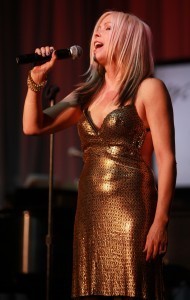
Terri Nunn performs at the ASCAP "We Write the Songs" concert. / Abby Brack
On Tuesday, the Library hosted the American Society of Composers, Authors and Publishers (ASCAP) Foundation for its annual event “We Write the Songs,” a night of songwriters performing their own tunes and telling the stories behind their creations. And, some of the performers were a throwback to my fondest memories growing up in the 1980s.
While “Riding on a Metro” will always remain my favorite song by Berlin, singer Terri Nunn didn’t disappoint with the group’s other hit song, “Take My Breath Away” – perhaps even doing just that to the audience as she left the stage to sing among them. The song was a classic one for the decade, from the soundtrack of one of the ultimate 80s movies – “Top Gun.”
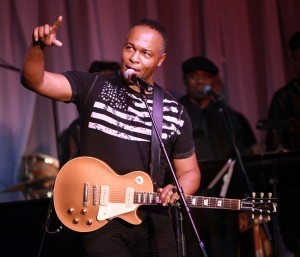
Ray Parker Jr. / Abby Brack
Speaking of 80s movies, Ray Parker Jr. didn’t disappoint singing his hit – the theme song to “Ghostbusters.” Who you gonna call?
Although popularized by Harry Belafonte, Irving Burgie’s “Day-O (Banana Boat Song)” was really given the star treatment in the 1988 film “Beetlejuice,” which is one of my all-time favorites as well. Burgie also performed “Jamaica Farewell.”
Others performing were Stephen Bishop, Melanie, Dan Foliart, Dino Fekaris, Chris Stapleton, Stephen Schwartz, Valerie Simpson (of Ashford & Simpson fame) and ASCAP president Paul Williams.
The Library is home to the ASCAP collection, which includes music manuscripts, printed music, lyrics (both published and unpublished), scrapbooks, correspondence and other personal, business, legal and financial documents, scrapbooks, and film, video and sound recordings.
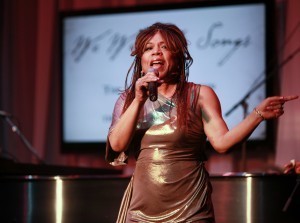
Valerie Simpson / Abby Brack
Established in 1914, ASCAP is the first United States Performing Rights Organization (PRO), representing the world’s largest repertory of more than 8.5 million copyrighted musical works of every style and genre from more than 350,000 songwriter, composer and music-publisher members.
May 16, 2012
Sealed With a Kiss
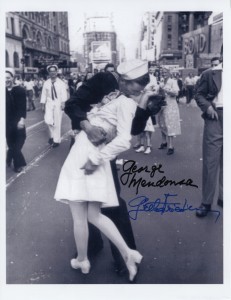
George Mendonsa (AFC/2001/001/42868), Photograph (PH01), Alfred Eisenstaedt photographer, Veterans History Project, American Folklife Center, Library of Congress
It’s probably one of the most iconic photographs of our time – a nurse seen swept into the arms of a sailor as the two get lost in a kiss. Sigh. The photo was taken on Victory Over Japan Day (V-J Day) at the end of World War II. But the identity of the subjects remained a mystery until now. Over the years, many have claimed to be the two.
Authors George Galdorisi and Lawrence Verria say the famous couple is George Mendonsa and Greta Zimmer Friedman, both now 89 years old. They discuss their findings in their book, “The Kissing Sailor.” Galdorisi and Verria used forensic analysis and other methods to uncover the mystery.
The oral histories of both Mendonsa and Friedman are part of the collections of The Veterans History Project of the Library of Congress.
Washington, D.C.’s own ABC-7 interviewed Friedman, who is a Frederick, Md., resident, for a piece that aired on yesterday’s evening broadcast.
The Huffington Post also reported on the story earlier this month.
Library of Congress's Blog
- Library of Congress's profile
- 74 followers



